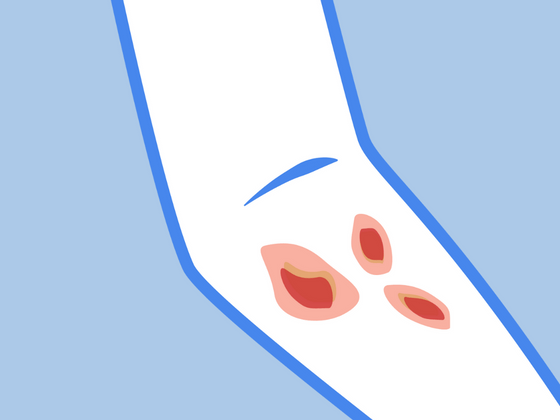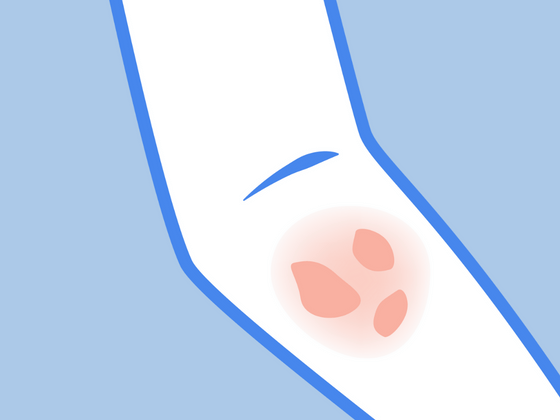Itchy rashes are a common problem that can occur because of a variety of reasons. Because of this, it can sometimes be difficult to determine what kind of rash you’re experiencing and where it came from. A common condition that affects approximately 10-20% of the population is eczema. Lupus is another long-term skin condition that causes a skin rash. In this blog post, we’ll take a closer look at lupus vs eczema.
Please keep in mind that although what we discuss in this post can relieve eczema, we are in no way medical professionals. If you’re experiencing severe eczema symptoms like an infection, it is best to seek medical advice immediately.
What is Eczema?
Eczema is a chronic skin condition that’s characterized by an itchy, red, and dry rash on the skin. It usually develops during childhood but can appear at any age, which is why eczema cream for babies is often needed. Many eczema-sufferers report that itch is the most burdensome symptom of the condition. In some cases, the skin may develop blisters which may leak fluid. If intense scratching causes the skin to crack or bleed, infection is more likely to develop.
If you're wondering what autoimmune disease causes eczema, the answer is that research isn’t sure what causes eczema but it’s believed to be linked to environmental factors and genetics.
Flare ups can be triggered by contact with irritating substances, many of them common household items. Some main triggers include pet fur, cleaning products, cosmetics, certain fabrics, certain foods, sweat, and stress. Using detergent for sensitive skin can help reduce fabric-related triggers.
What is Lupus?
Lupus is an auto-immune disease. This means that the body’s immune system attacks its own healthy tissues and organs. This results in inflammation, causing joint pain, fatigue, and skin rashes. It can even affect the blood cells, brain, heart, lungs, and kidney.
Like eczema, lupus likely results because of a combination of genetic and environmental factors. For example, exposure to sunlight can trigger an internal response or bring on lupus skin lesions. The condition may also be triggered by an infection or certain drugs. Lupus is more common in women and is more likely to affect people between the ages of 15 and 45.
Lupus Rash vs Eczema Symptoms
Like eczema, there is no cure but symptoms can be managed and improved with treatment as you go through different healing stages. Lupus can be difficult to diagnose due to the fact that symptoms can be similar to other conditions. However, one of its most obvious signs is a butterfly-shaped rash on the face that covers the cheeks and bridge of the nose. This facial rash occurs in most cases of lupus.
Other lupus signs include shortness of breath, headaches, fever, and dry eyes. Similarly to eczema, lupus is prone to flaring up and then settling down.
Treating Itchy Symptoms Naturally
As we mentioned, there is no cure for either eczema or lupus. However, there are some lifestyle changes and natural remedies you can try to manage the itch and reduce rash redness, including using gentle eczema cream.Here are some things we suggest:
Be Sun Smart
The sun’s harmful UV rays can trigger flare ups, making it important to wear protective clothing when exposed. Our Remedywear garments offer 35-50+ UV protection that keep skin well protected from harsh UV rays. They’re also extremely breathable and feature moisture-wicking properties so they’re great for warmer weather.
Here are some options we recommend:
Remedywear Long Sleeve Shirt for Kids
Remedywear Long Pants for Adults.
Remedywear Long Sleeve Shirt for Adults.
Remedywear Eczema Sleeves for Adults and Kids
Reduce Stress
Stress is a trigger for both eczema and lupus. Learn to manage your stressors by engaging in relaxing activities such as journaling, meditating, yoga, walking, painting, reading, gentle baths with eczema soap, and other self care ideas.
Watch What you Eat
Maintaining a healthy diet is an important part of overall well being. This means a diet rich in fruit, whole grains, vegetables, and heart healthy oils. Some people also find benefit in natural skincare products like beef tallow cream as part of their holistic approach. As food is a common eczema trigger, we suggest looking into an eczema elimination diet to help determine your specific food triggers.
References:








